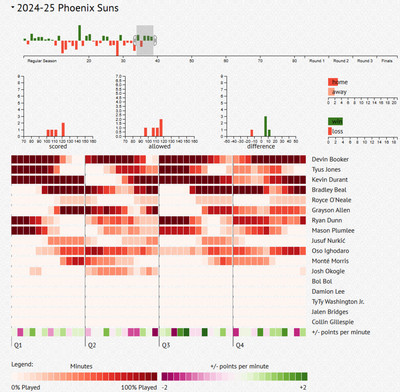
And that revelation is that Tyus Jones has been hurting the starting lineup when Beal and Booker are present.
The sign of any good team is the ability to adjust. There’s an old saying that I have, “champions adjust.” You don’t become a champion by doing the same thing over and over. You become a champion adjusting to your opposition, rethinking your approach, and executing your new game plan.
The Phoenix Suns, in a move that feels equal parts tactical and experimental, shook things up this past week by yanking both Bradley Beal and Jusuf Nurkic out of the starting lineup. On the surface, it seems like an obvious move. After all, Beal and Booker together can feel like two actors auditioning for the same role. Redundant, maybe even counterproductive. But no, the true puppet master here isn’t redundancy. It’s Tyus Jones.
Let’s pump the brakes before handing Mike Budenholzer a gold star for his “brilliance.” Context is everything. The Suns’ opponents during this stretch? A lineup of bottom-feeders with a collective record of 57-125 (.313). This wasn’t exactly a gauntlet of heavyweights. Sure, Bud pulled the lever, but let’s not pretend the lever itself holds mystical powers. It’s easy to look good when your opposition couldn’t find a rhythm with a metronome. Context, folks. Always context.
The move has been productive because it’s allowed Devin Booker to reset. It’s been an unusual season for him. His scoring is down, averaging just 24.6 points per game before the lineup change, his lowest since 2018. His three-point shooting has fallen off a cliff, even as he’s attempted the most threes per game in his 10-year career. Something about Booker’s game just seemed…off.
Part of the issue, at least on the surface, has been the lack of chemistry with Bradley Beal. Last season, the two shared 1,111 minutes on the court, and the Suns were a solid +136 in those minutes. Booker thrived as the point guard, with Beal in the shooting guard role, and vice versa. Positionless basketball in theory, but with clearly defined functions in practice. This season, that cohesion hasn’t been there.
Last season, despite the team’s struggles, Booker and Beal thrived when both played in their natural guard roles. However, the addition of Tyus Jones this season has disrupted that balance. With all three on the court, one of them is often pushed out of position to small forward, which has noticeably diminished their overall productivity.
In 413 minutes together prior to the adjustment, the team posted a -111 plus/minus in minutes in which Booker and Beal were on the court. The shift in roles, driven by Jones’s presence, has been a key factor in this decline, as it forces one of them out of their comfort zone when sharing the court. The Booker/Beal/Jones three-man lineup was a -77 in 276 minutes played.
Below are the substitution patterns before and after the ‘Beal to the Bench’ move. Note the rotation between Booker, Beal, and Tyus Jones.
The three-man lineup +/- before was -77 in 276 minutes, now it is 0 in 33 minutes. pic.twitter.com/2znx6c5qDn
— John Voita (@DarthVoita) January 13, 2025
A change was necessary, and the Suns made it: Beal moved to the bench while Booker remained in the starting lineup, with Tyus Jones subbing out for Beal when the moment called for it.
And the results? They’ve worked.
Since the shift, Booker has taken charge, leading the team with 26.6 points per game. Even more telling, in the 112 minutes that Beal and Booker have shared the court over the past week, the Suns are a +14 in scoring.
But let’s be clear, this isn’t about benching Beal so Booker can shine solo, only to swap them out like a game of tag. Beal is still logging nearly the same minutes he was as a starter; they’re just redistributed. A closer look at the substitution patterns reveals the real adjustment: it’s Tyus Jones who’s being pulled to make room for Beal.

You start to wonder: is Tyus Jones the problem here? The guy’s been a ghost offensively, racking up a grand total of three points over his last two games. It’s easy to point fingers. But then I catch myself, landing squarely in the “better to have him and not need him than need him and not have him” camp. Because we all remember last year, scrambling for a point guard like a gambler chasing his last chip.
The secret to success in this league isn’t about hammering the same nail every night; it’s about building a toolbox that can crack open any opponent. Tyus gives the Suns that versatility, even if it’s not always pretty. Sure, toss him against a 6’7” unicorn like LaMelo Ball, and he’s going to get eaten alive. But on other nights, when the matchup fits, he’s the piece that keeps the machine humming. And keeps us from watching Booker and Beal stumble through playmaking duties in crunch time.
This move — benching Beal and recalibrating the rotations — isn’t some panacea, especially given the bottom-feeder competition they’ve faced. But it’s progress. It’s a step toward maximizing what Booker, Beal, and yes, even Jones, bring to the table.
Since the change, the Booker/Beal/Jones three-man lineup has been a flat zero in 33 minutes. Neutral, but not disastrous. These aren’t seismic numbers, but they suggest the tinkering since the lineup change is working. A foundation to build on as the Suns find their rhythm.
The beauty of basketball lies in its constant evolution, and the Phoenix Suns are proving they’re willing to embrace it. This isn’t about some grand revelation or a stroke of genius from the coaching staff. It’s about adaptability. It’s about recognizing that what worked yesterday might not work today and being bold enough to shake the snow globe. Moving Bradley Beal to the bench isn’t a demotion; it’s a recalibration. It’s a recognition that championship teams aren’t built on rigid ideas but on fluidity, on understanding matchups, and on leveraging every piece of the roster for what it can offer on any given night.
Tyus Jones may not be the long-term solution, but he’s an option. An imperfect yet valuable cog in a system that’s still finding its stride. The Suns don’t need perfection right now; they need direction. And for the first time this season, it feels like they’ve found a path worth walking. The true test will come when the competition stiffens, but for now, there’s a sense of purpose, a sense that this team isn’t just drifting.
Adjustments have been made, and while they may not have rewritten the playbook, they’ve set the stage for a team willing to adapt in pursuit of something bigger. Because as the saying goes: champions adjust.
